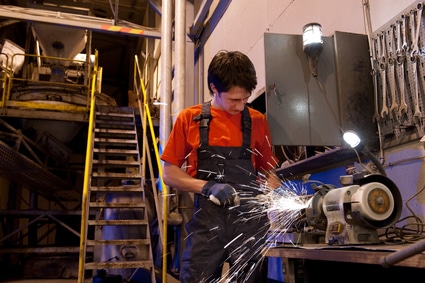Mechanics and technicians do critical work repairing valuable machines and vehicles. They keep factories and vehicles running.
Unfortunately, this critical part of our economy is often very heavy and sometimes dangerous work. Mechanics are required to lift and carry very heavy objects. They have to use tools that cause wear and tear on their bodies and work with dangerous chemicals.
The nature of their jobs often requires mechanics to work in difficult to reach and inconvenient locations. Also, they are often under time pressures to get machines back up and running. These things prevent them from being as safe as possible and can lead to injuries.
Fortunately, workers compensation provides coverage for mechanics when they suffer work-related injuries. While this knowledge provides some measure of relief, it is not enough to just be covered by workers compensation. For mechanics to receive the medical treatment and other benefits they should after a serious injury, they will need to fully understand the rules of workers compensation or have an attorney on their side who does.
 What common types of work-related injuries do mechanics and technicians suffer?
What common types of work-related injuries do mechanics and technicians suffer?
The types of injuries that mechanics suffer depends a lot on the following factors
- The specific type of work they do
- What tools they use
- The machines or vehicles they work on
Injuries from physical stress
Many mechanics work on vehicles such as aircraft, diesel equipment, or passenger vehicles. A lot of this work involves heavy lifting and carrying as well as using tools to apply a lot of pressure to engine and vehicle parts.
The physical stress created by this work can cause strains, sprains, and tears. While a strain or sprain may heal up relatively quickly, this stress often causes more serious injuries to the back and shoulders.
Common back injuries include herniated discs, bulging discs, and pinched nerves. These injuries often cause pain in the back and legs and make it difficult to stand and walk or lift anything heavy.
Some common mechanic arm injuries are rotator cuff tears and bicep tears. These injuries make it very difficult to work as a mechanic because prevent heavy lifting and working overhead.
Amputation and crush injuries
Mechanics and technicians work with dangerous equipment everyday. With this dangerous equipment, it does not take much to suffer a serious injury.
I have represented a number of people who have lost fingers from saws, grinders, or other power tools. These types of injuries also happen when someone’s hand is crushed by a heavy object or from being pulled into a machine that is running.
Chemical burns
Mechanics commonly work with flammable and dangerous chemicals. Serious burn injuries need to be treated very carefully.
Slipping or tripping
This is one of the biggest dangers that mechanics and technicians face. They face hazards everyday when they walk from place to place. Some common trip hazards include:
- Slick floors from oil or other fluids
- Vehicle parts or tools left on the floor
- Uneven flooring and cracks
Slipping or tripping at work can unfortunately cause all kinds of serious injuries. Often, these accidents result in knee and ankle injuries, but they can often cause back, arm, and head injuries as well.
Can workers compensation deny a mechanic’s work-related injury?
Yes. Your employer or their workers compensation insurance company may try to deny coverage for your injury. Although covering your injury would be the right thing to do, it is important to remember that you are dealing with for profit businesses who are seeking to make a profit.
Because your workers compensation case will cost them money, they may deny your claim in the hopes that it will save them money. Some of the common reasons that insurance companies use to deny claims are:
- That you did not report the injury immediately
- A positive drug or alcohol test or the failure to submit to a drug test
- Failure to follow a safety rule or use safety equipment
- Claims that you hurt yourself outside of work or had a preexisting condition
You may worry that a denial means that you cannot receive workers compensation benefits. It does not necessarily mean that. But, it does mean that you will likely have to get help to receive the benefits you should. Workers compensation attorneys can often sort out denials like those mentioned above and others to make sure you receive the benefits you should after an injury.
What benefits do mechanics receive when workers compensation covers their injury?
Georgia’s workers compensation law provide three main types of benefits to mechanics after an injury.
Wage loss benefits
The first type of benefit is wage loss benefits. These benefits are paid weekly when your injury causes you to lose earnings. They fall into two types – temporary total disability and temporary partial disability.
Temporary total disability compensates you when your injury prevents you from working at all. Temporary partial disability pays you when you are able to work but are making less money as a result of an injury.
Medical benefits
The second type of benefit is medical benefits. This benefits pays for the medical treatment and testing you need with certain authorized doctors.
Workers compensation covers one hundred percent of the cost of medical treatment and testing, so you do not have a copay or deductible. But, you have to follow the rules to make sure the insurance company has to pay for medical treatment and testing.
Permanent partial disability benefits
The third benefits is permanent partial disability benefits. These benefits only get paid if you have a permanent loss of function as a result of an injury.
Hopefully, you recover one hundred percent from your injury and do not have any permanent impairment. If you do have permanent impairment from an injury, this article discusses permanent partial disability benefits in detail.
What happens when a mechanic has permanent light duty restrictions?
Some of the serious injuries that mechanics suffer can result in permanent restrictions or limitations. Since mechanic work is very physically demanding, any sort of limitations can make it difficult or impossible to return to that type of work.
If you end up with permanent restrictions or limitations that prevent you from returning to work, the workers compensation insurance company should have to continue paying you weekly benefits for being out of work. But, there are limits on how long you can receive these benefits.
In this situation, settlement is an option that many people explore. Settlement can provide a lump sum payment in exchange for giving up your future workers compensation rights.
While settlement can be a good choice in the right situations, settlement is not something that you should rush into. Settlements are final once they are approved by the State Board of Workers’ Compensation, so you cannot come back and change them later. If you are interested in learning more about settlement, this article discusses what a settlement is and how the settlement process works.
Will the insurance company voluntarily pay all the workers compensation benefits they should pay?
The insurance company will probably not voluntarily pay everything they should. Why not? As I mentioned earlier, insurance companies are generally for profit businesses. Paying you workers compensation benefits costs them money, so they will usually try to pay as little as possible.
This means that you are probably going to have to fight to get the benefits you should receive. This comes up with medical benefits when the insurance company refuses to authorize you to see the doctor you want or refuses to approve the treatment your doctor recommends. It also comes up with your wage loss benefits when the insurance company tries to push the doctor to say you can go back to work before you are ready.
Making sure they do not take advantage of you is important. The insurance company’s responsibility under the workers compensation system is to pay for the medical treatment you need and compensate you for the time you cannot work. To make sure they do this, you need to fully understand the Georgia workers compensation system or have an attorney on your side who does.
 What common types of work-related injuries do mechanics and technicians suffer?
What common types of work-related injuries do mechanics and technicians suffer?









